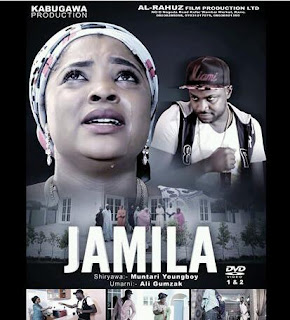Muhsin Ibrahim
@muhsin234
Director: Ali Gumzak
Producer: Mukhtar Young Boy
Story: Yakubu M. Kumo
Year: 2016
Company: Kabugawa Productions
Let me make it clear from the outset that this is not a regular film review. I am not writing this as an academic but as an ordinary film viewer. I just found the story of the above-titled film, its directorial work and thematic preoccupation worth writing on, hence this piece. It is challenging and rare to come across an enthralling Hausa film, especially these days, whose motifs and subject matter is that serious, bold and absorbing.
Jamila is entitled after the leading character’s name, acted by A’isha Aliyu Tsamiya. Her mother, Hadiza Muhammad works as a housemaid in a mansion. Adam A. Zango is the only scion of the affluent family. His father has since died and left a vast wealth for him; while the mother pampers him with everything a son may need or wish. He has just returned after completing his studies in the overseas. Thus, as it usually happens, Zango is a spoilt kid: a chain-smoker, a drug addict and an alcoholic.
Jamila is an orphaned girl helping her mother in carrying out the house chores. She is in a requitable love with Sadiq Sani Sadiq, the house’s guard. The two are planning to get married when Zango starts admiring her while she goes around the house, and soon enough declares his love. His mother is at first against it, but she later gives up and agrees, for she can do everything to please her only son. In no time, Jamila’s mother forbids her from seeing her heartthrob and compels her to accept Zango’s proposal. And so she does against her free will. Jamila is an obedient girl any mother would love to have, while her mother is a materialistic woman any good daughter would not like to have as a mother.
Jamila outlines condition for their marriage that he must quit smoking and alcoholism. He accepts her terms and the wedding is without any delay solemnised. But unknown to her, he resumes his old habit. A few weeks after the marriage, Jamila goes to see a doctor to check her blood pressure. Her mother comes to the house while she has yet to return. The drunken Zango rapes the mother. She returns and finds what happened. She is distressed beyond wording. The mother regrets everything and eventually dies due to excessive bleeding and sheer frustration. Jamila and her dying mother have resolved to not disclose what happened to all for the sake of her marriage and image. She also thinks a sober Zango would regret his doings and apologise, but he declines any offence and refuses to apologise. Thus she resorts to cursing him day and night, praying for his tragic downfall. He later dies in a fatal car crash. She profusely wishes he had been killed in a more painful and humiliating way.
That is the synopsis of the film, though the plot is slightly different as it is weaved with flashbacks, suspense, dramatic and involves some secondary characters such as Jamila’s auntie, her friend and people from the neighbourhoods who come for the burial of Zango but later disperse after learning of his abominable deeds before his death. His mother pleaded, but nobody stays.
I am particularly interested in the story following what is happening in our societies where rapists and murderous ritualists are on the loose. That makes it topical and timely. This is the kind of contemporary issues Kannywood filmmakers should (re)focus onto and produce films on, not the clichéd narratives of A loves B while C objects, or the familiar conflict between co-wives, or movies on nonsensical, often trite, transvestites/effeminates and some petty prostitutes, and the like. Films, especially those made in a culturally-bound and Islamicate society like Kano or northern Nigeria, in general, should be purposeful, topical and could, yet, maintain their artistic, intrinsic quality.

Comments
Post a Comment